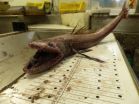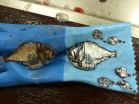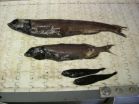(Press-News.org) Deep sea fishes remove and store more than one million tonnes of CO2 from UK and Irish surface waters every year, according to a new study led by the University of Southampton.
This natural carbon capture and storage scheme could store carbon equivalent to £10 million per year in carbon credits.
Fish living in deep waters on the continental slope around the UK play an important role carrying carbon from the surface to the seafloor.
It is assumed that deep water fishes all depend on particles that fall from the surface for their energy. These bottom-living deep water fishes never come to the surface and the carbon in their bodies stays at the seafloor. However, at mid-slope depths there is an abundant and diverse ecosystem where a huge volume of animals make daily vertical migrations to feed at the surface during the night. The animals conducting this migration then transport nutrients from the surface back to the deep.
Researchers from the University of Southampton and Marine Institute, Ireland used novel biochemical tracers to piece together the diets of deep-water fish revealing their role in transferring carbon to the ocean depths.
They found that more than half of all the fishes living on the seafloor get their energy from animals that otherwise go back to the surface, and not from settling particles. These bottom-living fishes therefore become a carbon capture and storage facility. Global peaks in abundance and biomass of animals at mid slope depths occur because this is the depth range where the vertically migrating animals are most easily captured by fishes that live at or near the seafloor.
Lead author, Dr Clive Trueman from the University of Southampton, says: "As fishing, energy extraction and mining extend into deeper waters, these unfamiliar and seldom seen fishes in fact provide a valuable service to all of us. Recognising and valuing these ecosystem services is important when we make decisions about how to exploit deep water habitats for food, energy or mineral resources."
As it is difficult to study animals living under a kilometre or more of water, the researchers measured forms, or isotopes, of carbon and nitrogen, in the muscles of fish caught in deepwater research surveys on the continental slope west of Ireland, at water depths ranging from 500 to 1800m. These were collected on the RV Celtic Explorer, a multi-disciplinary research vessel operated by the Irish Marine Institute.
Small differences in the mass of these isotopes mean that they are processed at slightly different speeds in the body, leading to patterns which can show who eats who in the slope ecosystem. By measuring the isotopes in all of the most common species, the researchers were able to estimate how much carbon is captured and stored by these deep water fish.
The study, which is published in the journal Proceedings of the Royal Society B, was funded by the University of Southampton and the Marine Institute.
INFORMATION: END
Deep sea fish remove 1 million tonnes of CO2 every year from UK and Irish waters
2014-06-04
ELSE PRESS RELEASES FROM THIS DATE:
The Lancet Psychiatry: Study shows increasing rates of premature death and violent crime in people with schizophrenia since 1970s
2014-06-04
New research, published in The Lancet Psychiatry journal, shows that rates of adverse outcomes, including premature death and violent crime, in people with schizophrenia are increasing, compared to the general population.
The results come from a unique study, led by Dr Seena Fazel, at Oxford University, UK, which analyses long-term adverse outcomes – including conviction for a violent crime (such as homicide or bodily harm) premature death (before the age of 56), and death by suicide – between 1972 and 2009 in nearly 25,000 people in Sweden diagnosed with schizophrenia ...
Pneumococcal conjugate vaccine is effective for preventing community-acquired pneumonia
2014-06-04
A 10-valent pneumococcal conjugate vaccine (PCV) is effective in reducing the number of new cases of likely-bacterial community-acquired pneumonia in infants in Latin America, according to a study published in this week's PLOS Medicine. Xavier Sáez-Llorens and colleagues from Department of Infectious Diseases, Panama found that the 10-valent PCV reduced the number of new cases of likely-bacterial community-acquired pneumonia in infants by 22% (95% CI: 7.7, 34.2) compared to those who received the control vaccine in the per-protocol cohort at the pre-planned interim analysis ...
Place and cause of death in centenarians: A population-based observational study in England
2014-06-04
Centenarians are more likely to die of pneumonia and frailty or "old age" and less likely to die of the chronic conditions often associated with old age, such as cancer or ischemic heart disease, compared with older adults younger than 100 years, according to a study by Catherine Evans and colleagues from King's College London, London, UK. Centenarians were most likely to die in a care home (61%) or hospital (27%) and less likely to die at home (10%) or in hospice care (0.2%). Higher care bed capacity was associated with fewer deaths of centenarians in hospital.
The ...
New health services needed for rise in 100-year-olds
2014-06-04
Over 35,000 people lived to 100 years or more in England over the last ten years, with a large proportion subsequently dying from frailty exacerbated by pneumonia, according to a new study by King's College London. With the number of centenarians set to grow, end-of-life care needs to be tailored to the increasing frailty in this age group, warn the King's palliative care researchers. Boosting care home capacity and planning health services for the rise in centenarians could help to reduce reliance on hospital admission at the end of life and ensure a better quality of ...
Unexpected diversity of egg yolk proteins play a key role in ant sociality and castes
2014-06-04
The social insects, including bees, wasps, ants and termites have developed a highly advanced society where division of labor amongst workers to serve the queen's reproduction has long fascinated biologists who have wanted to uncover the molecular pathways driving the complex behavior of insect societies.
In the advanced online edition of Molecular Biology and Evolution, Claire Morandin et al. performed molecular evolutionary analyses on the egg yolk forming protein, Vitellogenin (Vg), and its many forms, amongst seven Formica ant species. Vitellogenin is known to play ...
Discovering a hidden source of solar surges
2014-06-04
Cutting-edge observations with the 1.6-meter telescope at Big Bear Solar Observatory (BBSO) in California have taken research into the structure and activity of the Sun to new levels of understanding. Operated by New Jersey Institute of Technology (NJIT), the telescope at Big Bear is the most powerful ground-based instrument dedicated to studying the Sun.
A group of astronomers led by Dr. Santiago Vargas Domínguez has analyzed the highest- resolution solar observations ever made. A summary of their work at BBSO was presented on June 2 at the 224th meeting of the American ...
New device isolates most aggressive cancer cells
2014-06-04
ITHACA, N.Y. – Not all cancer cells are created equal – some stay put in the primary tumor, while others move and invade elsewhere. A major goal for cancer research is predicting which cells will metastasize, and why.
A Cornell cancer research team is taking a new approach to screening for these dangerous cells, using a microfluidic device they invented that isolates only the most aggressive, metastatic cells.
"The approach we've taken is a reverse approach from what is conventionally done," said Cynthia Reinhart-King, associate professor of biomedical engineering and ...
Many breast cancer patients don't get treatment for heart problems
2014-06-03
Only a third of older breast cancer patients saw a cardiologist within 90 days of developing heart problems, in a study presented at the American Heart Association's Quality of Care and Outcomes Research 2014 Scientific Sessions.
Breast cancer patients with heart problems who saw a cardiologist were more likely to receive standard therapy for their heart failure than those who did not see a heart specialist, the study found.
"The majority of older women who develop heart problems after their breast cancer therapy aren't treated by a cardiologist, and they had lower ...
Community program helps lower blood pressure among minorities
2014-06-03
Minorities at a higher risk of developing hypertension used a community-based program to significantly lower their blood pressure, researchers said at the American Heart Association's Quality of Care and Outcomes Research 2014 Scientific Sessions.
Minorities at a higher risk of developing hypertension used a community-based program to significantly lower their blood pressure, researchers said at the American Heart Association's Quality of Care and Outcomes Research 2014 Scientific Sessions.
Researchers assessed the use of the American Heart Association's Check. Change. ...
Implanted heart device linked to increased survival
2014-06-03
DURHAM, N.C. -- Implantable cardioverter defibrillators (ICDs) are associated with improved survival among heart failure patients whose left ventricles only pump 30 to 35 percent of blood out of the heart with each contraction, according to a study from the Duke Clinical Research Institute.
The findings, published in the June 4 issue of the Journal of the American Medical Association, support existing recommendations to implant ICDs in patients with a left ventricular ejection fraction (LVEF) – a measurement of how much blood is squeezed out of the heart – of 35 percent ...


